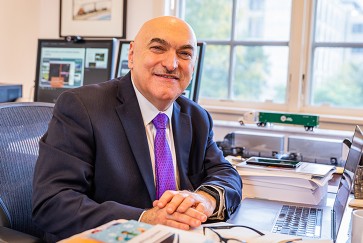J. Peter Rosenfeld, a longtime professor of psychology in the Weinberg College of Arts and Sciences at Northwestern University, died Feb. 15. He was 81.
One of the longest-serving faculty members in the department, Rosenfeld joined the psychology department in 1970 as an assistant professor.
Rosenfeld’s research mainly concerned perfection of physiological, cognitive and behavioral means for detection of concealed information for field forensic use: such as in crimes, including prevention of terror acts and diagnosis of malingered head injury, mostly relying on the P300 brain wave (event-related potential/ERP) as a sign of recognition.
According to Richard Zinbarg, professor and chair of Northwestern’s psychology department, Rosenfeld came to Northwestern to join Aryeh Routtenberg in building a neuroscience group within the department. Routtenberg passed away in 2016.
“I would say that the two of them certainly succeeded in that effort,” Zinbarg said. “I believe it is fair to say that he was one of the world’s leading experts on lie detection and a highly respected ERP researcher more generally.”
Rosenfeld was psychology professor Ken Paller’s next-door neighbor in the Cresap Laboratory on the Northwestern campus.
“Peter was always friendly, ready to share a smile and kind words, with boundless enthusiasm for psychophysiology and for teaching students about this fascinating field,” Paller said. “He will long be remembered for his innovative contributions to methods for the psychophysiological detection of deception.”

Most recently, the Rosenfeld lab was investigating a promising new method for discriminating criminals (e.g., jewel thief) from innocent persons who are simply knowledgeable of the crime (e.g., jewelry store clerk). “Our hopes being to keep innocent persons out of jail,” said Joseph Olson, Rosenfeld’s most senior doctoral student at Northwestern.
“The Rosenfeld lab was always very industrious, even despite the pandemic,” Olson said. “We were also teaching computers to read people's brainwaves and predict whether an individual was guilty of a crime or not — with high levels of success. We plan to continue this project, our goal being to achieve the highest accuracy possible in discriminating between guilty and innocent individuals.”
In 2010, Northwestern Now wrote about Rosenfeld’s study, "A Mock Terrorism Application of the P300-based Concealed Information Test," with co-author and then graduate student John B. Meixner, which had just published in the journal Psychophysiology.
In the study, the researchers used the P300 testing in a mock terrorism scenario in which the subjects were planning, rather than perpetrating, a crime. The P300 brain waves were measured by electrodes attached to the scalps of the make-believe “persons of interest” in the lab.
The most intriguing part of the study in terms of real-word implications, Rosenfeld said at the time, was that even when the researchers had no advance details about mock terrorism plans, the technology was still accurate in identifying critical concealed information.
“Without any prior knowledge of the planned crime in our mock terrorism scenarios, we were able to identify 10 out of 12 terrorists and, among them, 20 out of 30 crime-related details,” Rosenfeld said. “The test was 83 percent accurate in predicting concealed knowledge, suggesting that our complex protocol could identify future terrorist activity.”
Over Rosenfeld's academic career, he published more than 200 peer-reviewed articles, becoming a respected figure of authority across multiple literatures. He made a name for himself in both the pain analgesia literature and the EEG biofeedback literature, where he taught patients to alter their brainwaves in order to treat psychological disorders, such as depression.
“In the mid to late ’80s, Dr. Rosenfeld published what is, to my knowledge, the first peer-reviewed article on brainwave-based lie detection, and he remained the world's leading expert on the topic for nearly 40 years,” Olson said.
Over the years, his research had been documented by film crews, including Discovery Channel Canada, which filmed members of the Rosenfeld lab for a piece on deception, and his research had been featured in Scientific American, ABC News, as well as by local Chicago media outlets.
Along with his research, colleagues remember Rosenfeld’s love for opera. On his website he wrote, “I like music, all kinds, but I am the department's unofficial resident opera fanatic.”
According to Zinbarg, Rosenfeld’s family remarked on how much he loved his work, loved his students, loved the department, loved Northwestern and “was passionately engaged in his teaching and research right up until the very end.”
Rosenfeld was a member of AAAS, Society for Neuroscience, International Association for Study of Pain, American Psychological Society, Association for Applied Psychophysiology, American Psychological Association, American Pain Society, Society for Psychophysiological Research and the American Polygraph Association.
He earned a B.A. and M.A. in biology/humanities in 1959 and English and Comparative Literature in 1961 respectively, from Columbia University; and a M.A. and Ph.D. in psychology and physiological psychology in 1969 and 1971 respectively, from the University of Iowa.
Rosenfeld was a resident of Glencoe, Ill. He is survived by his wife, Elba Del Carmen Olivares-Lopez; children Jon (Tamara Raab) Rosenfeld and Stacey (Elizabeth Cappo) Rosenfeld; stepchildren Lorenzo Naranjo (Christine Fiebig), Maria Alicia Naranjo (Juan Figueroa), and Patricia Naranjo (Marcello Fuenzalida); grandchildren Alexandria Malec, Lauren Rosenfeld, Trevor Rosenfeld, Charlie Rosenfeld and Dante Rosenfeld; step grandchildren Francisco Rocca, Eduardo Naranjo, Benjamin Fuenzalida, Josephine Gallo and Lucy Gallo; and great grandchild Jakub Gorlo.
Click here to visit the department of psychology’s In Memoriam page.
A private memorial service was held. Memorial donations may be directed to the Wagner Society, P.O. Box 514; Wilmette, IL 60091 or St. Jude Children's Research Hospital.

